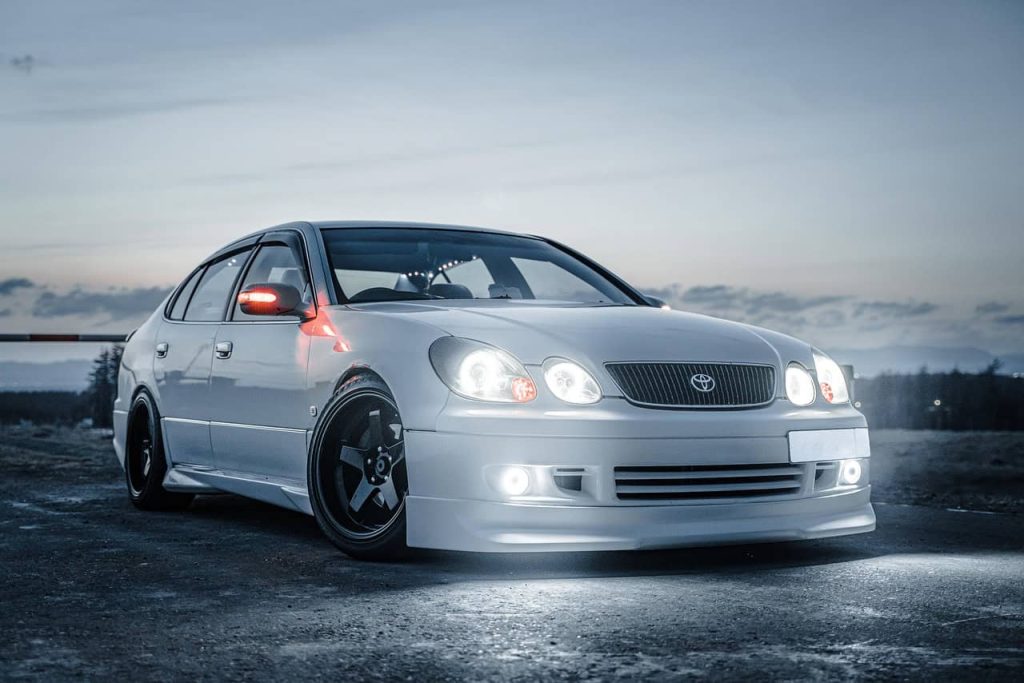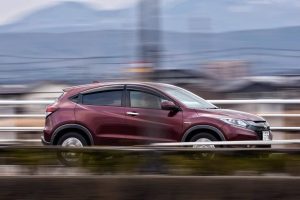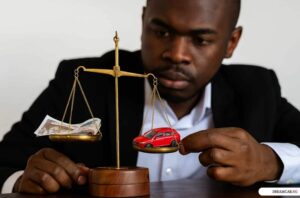If you’ve ever searched for the cheapest cars in Nigeria, you’ve probably realized it’s not as straightforward as it seems.
Prices for the same car model can vary wildly, sometimes by hundreds of thousands of naira depending on the city, dealership, import route, or even the timing of your purchase.
A Toyota Corolla that sells for ₦5 million in Lagos might go for ₦4.2 million in Ibadan, while the same car could cost more in Abuja or Port Harcourt due to logistics, demand, or dealer markup.
But why does this happen? Several factors influence car prices in Nigeria, including import duties, exchange rates, fuel costs, shipping delays, and dealer competition.
Understanding how these elements play together will help you spot hidden bargains, avoid overpriced listings, and time your purchase for maximum value.
In this 2026 Smart Buyer Guide, we’ll break down where to find the most affordable cars in Nigeria, both online and offline, and show you how to verify genuine deals, negotiate better prices, and avoid common traps that make many buyers overspend.
Searching for a budget Tokunbo ride, a fairly used car, or even a low-cost new model? this guide will help you buy smarter, not harder.
Recommended: 25 Cheapest Cars In Nigeria
The Impact of Import Duties and Exchange Rates
One of the biggest reasons a car may be expensive or cheap in Nigeria comes down to import duties and foreign exchange rates.
Most cars in Nigeria are imported from countries like the United States, Germany, Japan, and the United Arab Emirates.
The Nigeria Customs Service charges import duties and levies that can be as high as 35–70% of the car’s value, depending on the vehicle type and year of manufacture.
When the Naira weakens against the US Dollar, it instantly raises the cost of importing cars.
For example: In 2023, when the exchange rate moved from ₦450/$ to over ₦700/$, the cost of importing a Toyota Corolla jumped by more than ₦1.5 million overnight.
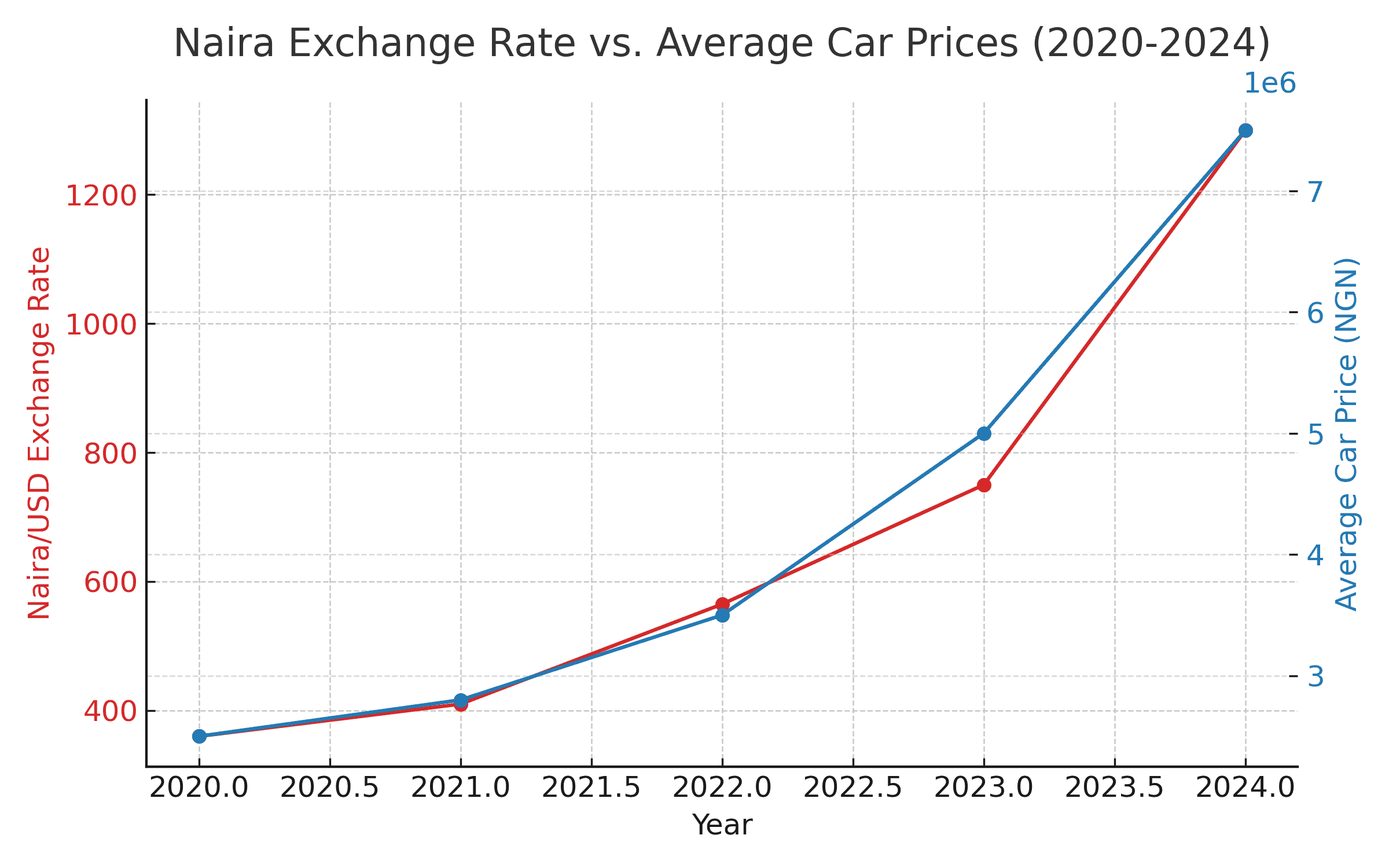
Recommended: How Foreign Exchange Rate Affects Car Import Price In Nigeria
Tokunbo vs. Brand New Cars: Which is Cheaper?
In Nigeria, you’ll often hear the term “Tokunbo”, it means foreign used cars. They are usually shipped from abroad after being used for a few years.
Why Tokunbo cars are cheaper:
- They’ve already depreciated in value overseas.
- Lower upfront cost compared to brand new.
- Easy availability of spare parts for popular models.
Why brand new cars cost more:
- Directly from authorized dealers with warranty.
- Zero mileage, no wear and tear.
- Often subject to higher customs duties due to full retail value.
However, if you’re on a budget but want reliability, a well-inspected Tokunbo can be 40–60% cheaper than a brand new car of the same model.
Check out How To Inspect A Used Car in Nigeria
Popular Car Brands With The Best Resale Value
Whether you buy a cheap car or a luxury ride, resale value matters, especially in a country where many people upgrade vehicles every few years.
Top brands with the best resale value cars in Nigeria:
- Toyota – Reliable, fuel-efficient, and easy to maintain.
- Honda – Known for durability and high demand in the used market.
- Lexus – Luxury feel but still practical for Nigerian roads.
- Mercedes-Benz – Premium appeal, with strong resale for certain models.
We’ve compiled a comprehensive list of top 10 best resale value cars in Nigeria, you may want to check it out
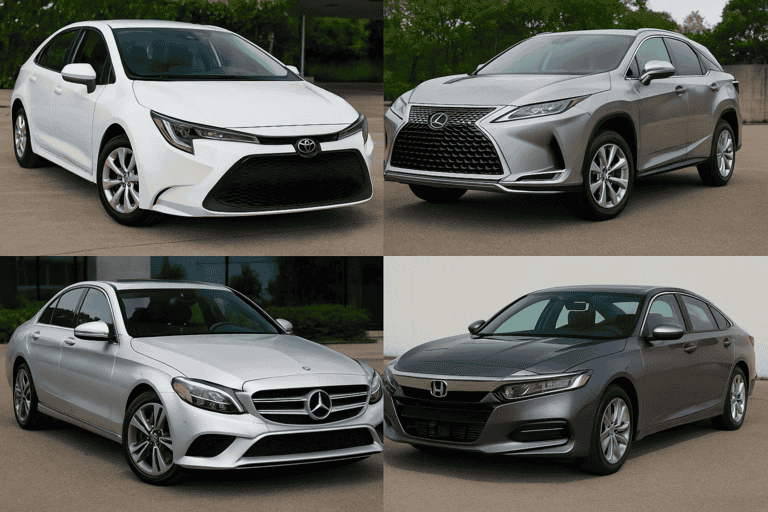
Cheapest Places to Buy Cars in Nigeria
Finding the cheapest cars in Nigeria isn’t just about what you buy, it’s also about where you buy it.
Some locations have a reputation for offering better deals, more variety, and easier negotiations than others.
Whether you’re looking for a Tokunbo sedan, SUV, or even a commercial bus, these are the hotspots every smart Nigerian car buyer should know.
Lagos: Berger, Ikeja, and Online Listings
Lagos is Nigeria’s largest automotive market, and it’s no surprise that it’s also home to some of the cheapest car deals in the country.
Key hotspots in Lagos:
- Berger Auto Market – Located along Apapa–Oshodi Expressway, Berger is famous for its huge variety of Tokunbo cars at competitive prices.
- Ikeja Car Lots – Smaller but often more negotiable than Berger, perfect if you want less crowd and more personal dealer attention.
- Online Car Listings – Websites like Jiji.ng, carlots.ng, buycars.ng, and Facebook Marketplace have hundreds of listings daily.
However, always compare prices between physical markets and online listings before committing.
Some dealers upload cars at a slightly higher price online but are willing to negotiate in person.
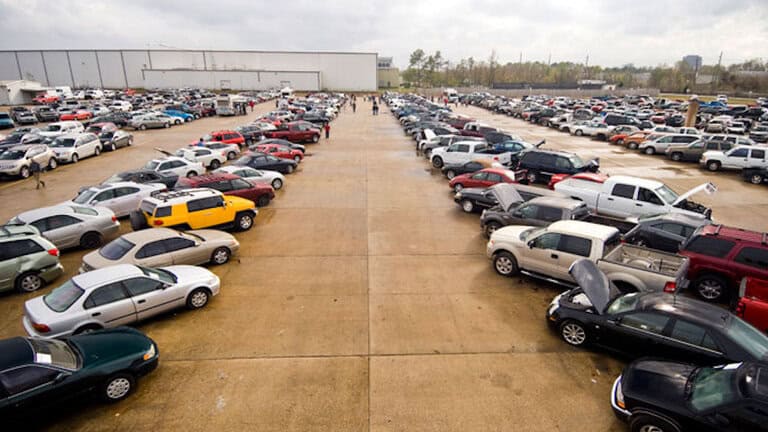
Also check out: Best Used Car Dealers In Nigeria
Abuja: Garki Market and Dealers
Abuja may be smaller than Lagos in terms of car volume, but it offers surprisingly affordable deals, especially if you know where to look.
Top locations in Abuja:
- Garki International Market – A major hub for both Nigerian-used and Tokunbo cars.
- Area 1 and Area 10 Dealers – Smaller dealer clusters where negotiation is often easier.
- Auction Sales – Occasionally, government or corporate fleet cars are sold at auctions for way below market price.
DreamCar Tip: Abuja cars often have less wear and tear compared to Lagos vehicles, thanks to better roads and lighter traffic.
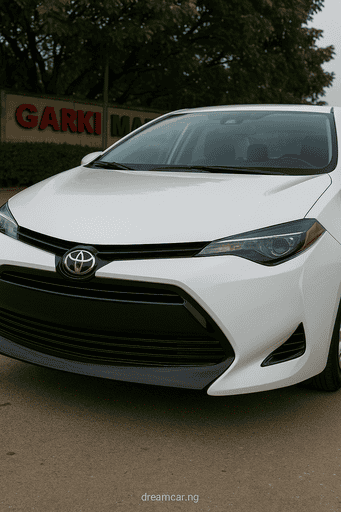
Port Harcourt and Other Major Cities
Port Harcourt serves as an entry point for many imported cars, making it an underrated spot for deal, especially for SUVs and trucks.
Why Port Harcourt is worth checking:
- Cars arrive through Onne Port, reducing inland transportation costs.
- Many sellers are looking to close quick sales to avoid storage fees.
- Local buyers sometimes get first pick before cars are shipped to Lagos.
Other notable Nigerian cities for cheaper cars include:
- Kano – Popular for budget-friendly sedans.
- Enugu – Known for well-maintained Nigerian-used cars.
- Benin City – Smaller market, but easier price negotiations.
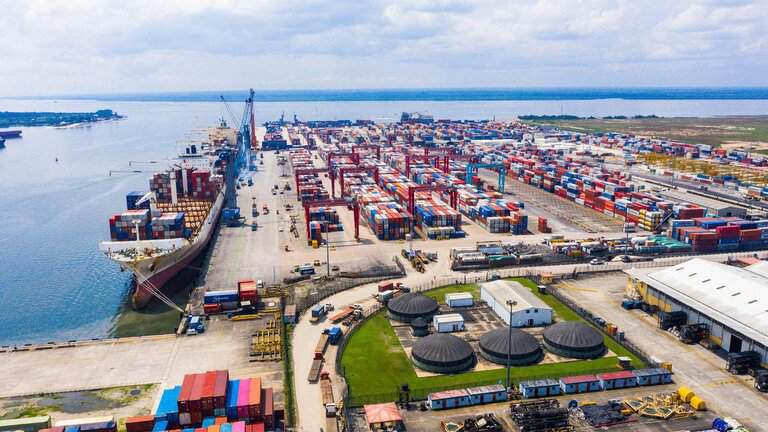
Buying From Private Sellers vs. Dealerships
When hunting for the cheapest cars in Nigeria, one big decision is whether to buy from a private owner or go through a dealership.
Buying from Private Sellers is often cheaper since there’s no dealer markup plus you also have direct access to car history from the owner.
However, it may come with higher risk if you don’t bring your mechanic along or know how to inspect a vehicle yourself.
Buying from dealerships on the other hand usually come with inspection reports, easier access to financing options.
But then, the disadvantage is the higher prices due to profit margins and overhead.
DreamCar Tip: If you’re buying from a private seller, always bring a trusted mechanic for inspection and verify ownership documents at the licensing office.
Also check How to Verify Car Ownership in Nigeria Before Purchase
Best Websites and Apps for Affordable Cars in Nigeria
In today’s Nigeria, you don’t have to visit a physical market to find great car deals.
From your phone or laptop, you can explore hundreds of listings, compare prices, and even negotiate without leaving your home.
Knowing the best websites and apps to buy cars in Nigeria can save you time, money, and unnecessary stress.
Nigerian Car Marketplace Websites
If you’re looking for affordable cars for sale in Nigeria, there are several reputable online platforms where sellers and buyers connect.
Top Nigerian car websites for good deals:
- Jiji.ng – One of the largest classified sites in Nigeria, with thousands of listings for Tokunbo and Nigerian-used cars.
- Olist.ng – Offers both cars and related services, with options to chat directly with sellers.
- Carlots.ng – Comprehensive range of services to streamline car ownership, including auto financing, price evaluation tools, and VIN checks
- Facebook Marketplace – Offers variety of cars for sale especially directly from the owners, also with options to negotiate with sellers through chat
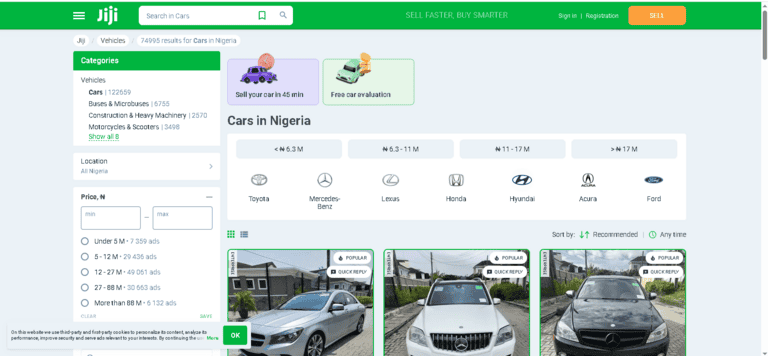
Looking to buy or sell a car? Reach out to us for a direct consultation and a secure transaction.
WhatsApp And Facebook Groups For Car Deals
Social media isn’t just for chatting and memes, it’s also where thousands of Nigerians buy and sell cars daily.
WhatsApp Car Groups:
Many dealers and private sellers run WhatsApp groups where they post fresh car listings daily.
You can join via invite links shared by trusted sellers or car enthusiast communities.
Facebook Car Deal Groups:
Examples include Cars for Sale in Lagos, Tokunbo and Nigerian Used Cars, and Affordable Cars in Abuja.
Look for groups with active admins, recent posts, and seller verification rules.
DreamCar Tip: Some fake sellers use these platforms for scams, so always verify the car and the seller before making payment.
How To Verify A Seller Before Making Payment
Whether you’re buying through a website, app, or social media, seller verification is the most important step to avoid scams.
Steps to verify a car seller in Nigeria:
Check Their Track Record – On platforms like Jiji, look for sellers with multiple verified ads and positive reviews.
Request the Vehicle Identification Number (VIN) – Use free online VIN checkers to confirm the car’s history, accident record, and mileage.
Meet in Person at a Safe Location – Public places like petrol stations, police stations, or mechanic workshops are ideal.
Inspect All Documents – Ensure the seller provides original vehicle papers such as:
- Proof of ownership
- Customs duty papers (for Tokunbo)
- Roadworthiness certificate
Never Make Full Payment Online Without Physical Inspection – If possible, use escrow payment services.
Also read: How To Check A Car’s True Market Value
How to Negotiate for the Lowest Price
Knowing where to buy cheap cars in Nigeria is one thing, getting them for the lowest possible price is another skill entirely.
Negotiation isn’t just about haggling; it’s about information, timing, and leverage.
Follow these proven steps to save hundreds of thousands of Naira on your next car purchase.
Research market prices before meeting the seller
The first rule of car price negotiation in Nigeria is simple: know the real market value before you step in.
- Check multiple sources – Compare prices for the exact make, model, and year across platforms like Jiji, carlots, Carmart or facebook marketplace
- Factor in location – A Tokunbo Toyota Corolla might be ₦4.5M in Lagos but ₦4.1M in Port Harcourt.
- Ask quietly in forums – Join Nigerian car enthusiast forums or Facebook groups and ask about current prices to get insider figures.
DreamCar Tip: Walk into negotiations with three recent listings showing lower prices. Politely show the seller that you know the market range, and they’ll be more likely to match it.
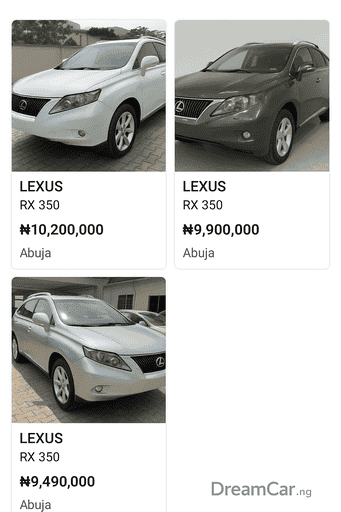
Spotting Hidden Faults To Use In Negotiation
Even well-maintained cars may have small faults, and in negotiation, faults equal bargaining power.
Common issues to look out for:
- Minor body scratches or dents – Point these out and mention repainting costs.
- Worn tires or brake pads – Use this as a reason to request a discount.
- Dashboard warning lights – Ask the seller if they can fix them, or reduce the price accordingly.
- Old battery – Mention that you’ll need to replace it soon.
DreamCar Tip: Bring a trusted mechanic to the inspection. Not only will they spot issues you might miss, but their presence signals to the seller that you are serious and informed.
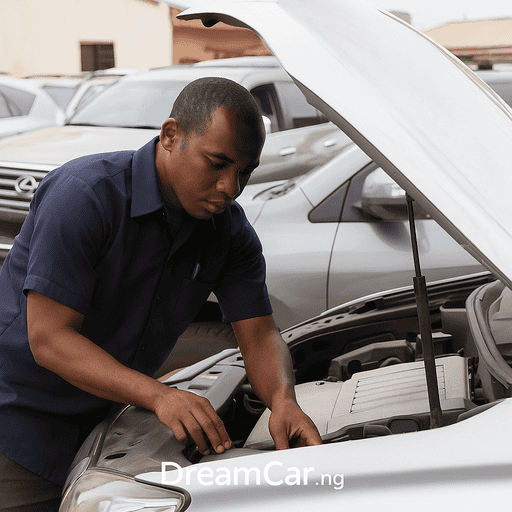
Timing your purchase for maximum savings
The best time to buy a car in Nigeria can make a huge difference in the final price you pay.
Best times to negotiate:
- End of the month – Sellers may reduce prices to hit sales targets.
- Year-end (November–December) – Many sellers slash prices to clear stock before the new year.
- After major holidays – Demand often drops after Christmas and Eid celebrations, making sellers more flexible.
Times to avoid:
- When the dollar rate just spiked – Sellers are usually firm on prices to cover higher import costs.
- Peak demand seasons – Prices often rise before festive periods.
DreamCar Tip: If you find a great car outside peak buying season, act fast you’ll have less competition from other buyers.
Tips to Avoid Scams When Buying Cheap Cars
When a deal looks too good to be true, it probably is especially in Nigeria’s car market.
Cheap cars attract both genuine sellers and fraudsters looking to make quick money from unsuspecting buyers.
Below are practical tips to protect yourself from falling victim to car scams.
Common Car Buying Scams In Nigeria
The Nigerian used car market is full of opportunities, but also risks. Some common scams include:
- Fake seller with stolen pictures – Scammers post attractive car photos from foreign sites or Instagram pages but have no actual car to sell.
- Odometer tampering – Mileage is rolled back to make a car seem newer than it is.
- Deposit scams – A seller requests a “commitment fee” or part payment before you see the car, then disappears or block you
- Hidden accident or flood damage – Cars previously involved in serious accidents or floods are patched up and sold at “bargain” prices.
- Fake escrow agent – Scammers pose as escrow companies to collect funds from buyers and sellers, but disappear after payment.
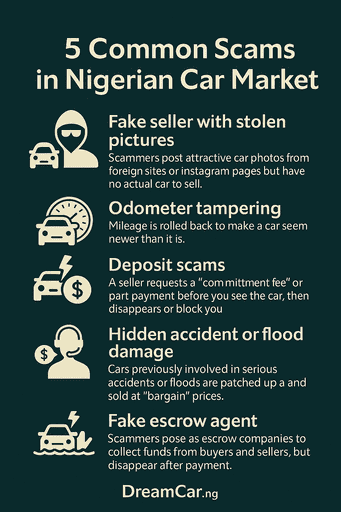
Recommended: How to avoid car scams in Nigeria
Why VIN checks are important and how to do it
A Vehicle Identification Number (VIN) check is one of the easiest ways to verify a car’s history.
Every car has a unique VIN, usually found on the dashboard near the windshield or on the driver’s door frame.
Benefits of a VIN check:
- Reveals accident history
- Shows past ownership records
- Flags if the car was stolen
- Confirms mileage authenticity
How to do a VIN check in Nigeria:
- Get the car’s VIN from the seller.
- Use trusted platforms like AutoCheck Africa or Carfax (for foreign used cars).
- Review the report carefully for any red flags.
Also Check: How to Perform a VIN Check in Nigeria
Always Meet in Safe, Public Locations
If you’re buying from a private seller, insist on meeting in a public, secure area such as:
- Busy car parks
- Petrol stations
- Police station parking lots (highly recommended)
Extra safety tips:
- Never go alone – take a trusted friend or mechanic.
- Avoid night-time meetups.
- If possible, test-drive the car in a safe route with minimal traffic.
DreamCar Tip: In Nigeria, legitimate sellers will never rush you into making payments. If a seller insists on “pay now or lose the car,” take it as a red flag.
Frequently Asked Questions About Buying the Cheapest Cars in Nigeria
Buying a budget-friendly car in Nigeria can be a game-changer for your finances, but it often comes with many questions, especially for first-time buyers.
Below, we’ve compiled answers to some of the most common queries from Nigerians searching for the cheapest cars without compromising on quality.
What’s The Cheapest Reliable Car Brand in Nigeria?
When it comes to affordable yet reliable cars in Nigeria, Toyota and Honda often top the list.
Toyota models like the Toyota Corolla and Toyota Camry are widely loved for their fuel efficiency, availability of spare parts, and durability on Nigerian roads.
For buyers on a tighter budget, Nissan Almera, Mazda 323, and Volkswagen Golf 3 are also great options, they’re affordable to purchase and maintain.
Check out our list of the top 7 cheapest used car used cars in Nigeria
DreamCar Tip: Always look at long-term maintenance costs, not just the purchase price. Sometimes a slightly more expensive model can save you thousands in repairs over the years.
Are Auction Cars in Nigeria Worth Buying?
Auction cars can be an incredible deal, but they come with their own set of risks. In Nigeria, auctioned cars often come from:
- Banks reclaiming vehicles from loan defaulters
- Government seizures
- Corporate fleet replacements
The pros?
- Significantly cheaper prices; sometimes 30-50% less than market value
- Potential to get newer models at a lower cost
The cons?
- Some cars may have hidden mechanical issues
- Limited opportunity to test drive before purchase
Can I Buy A Cheap Car Directly From The Port?
Yes, you can! Buying directly from the port in Lagos, Tin Can Island, or Port Harcourt is one of the best-kept secrets for getting cheap cars in Nigeria, especially foreign-used (Tokunbo) vehicles.
Here’s how it works:
- Find a trusted clearing agent – they’ll handle the paperwork and guide you through the process.
- Identify your preferred car model before contacting the agent.
- Pay for customs clearance fees and port charges in addition to the car price.
DreamCar Tip: Only deal with verified clearing agents and request a VIN check to ensure the car hasn’t been stolen or involved in serious accidents abroad.
Balancing Price With Reliability
When hunting for the cheapest cars in Nigeria, it’s tempting to focus only on the price tag.
However, a true bargain is one that saves you money in the long run. Choosing a vehicle solely because it’s cheap can lead to high repair costs, poor fuel efficiency, and endless headaches.
Instead, aim for a balance, look for affordable cars that also have a strong reputation for reliability, readily available spare parts, and a good resale value.
Brands like Toyota, Honda, and Nissan often hit this sweet spot.
Why Patience Is Your Best Money-Saving Tool
The Nigerian car market changes daily, exchange rates, import duties, and demand can make prices fluctuate dramatically.
Rushing into a purchase often leads to overpaying. Smart buyers know that waiting for the right moment, such as end-of-year sales, dealer clearance events, or when sellers urgently need cash, can save hundreds of thousands of naira.
You can give yourself the upper hand in negotiations by taking your time, researching thoroughly, and comparing multiple offers from both online platforms and physical markets.
Patience isn’t just a virtue but a proven money-saving strategy when it comes to the game of buying affordable cars in Nigeria.
As a first time buyer, you may want to check out our beginner guide to buying your first car in Nigeria

